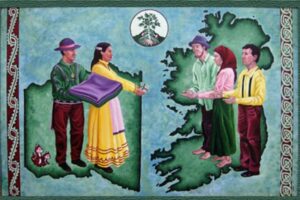During this moment when the human family is sharing a common tragedy, I’m reprising a post from September of 2017 to remind us of what it means to be brothers and sisters in this common family of ours. — Pat
There is a sculpture, Kindred Spirits, that stands in a park in the small town of Middleton in East Cork, Ireland. It tells the story of how two nations came together in a dark and tragic time through a simple act of kindness.

This is a story my Grandpa Pat shared with me.
My grandparents immigrated from Ireland early in the 20th century. They left with only the clothes on their backs, with little hope of ever returning. They were part of the second generation of emigrants who fled Ireland after the potato famine, an event that had left Ireland in ruins.
The Famine was a result of the failure of the potato crop, the food staple of the Irish people. More than a million people perished and millions more emigrated. Ireland lost a quarter of its population.
The British government had ruled Ireland with racist cruelty dressed in a laissez-faire doctrine that denied relief to the famine-stricken people. According to Charles Trevelyan, the British administrator in charge of relief. “The judgement of God sent the calamity to teach the Irish a lesson, that calamity must not be too much mitigated. …The real evil with which we have to contend is not the physical evil of the famine but the moral evil of the selfish, perverse and turbulent character of the people.”
The London Times observed in an article published in 1848, “The Celts shall be on the banks of Shannon as the Red Man on the banks of Manhattan.”
The so-called “Red Man” had been harshly dealt with by the American government over three hundred years of virtual genocide.
In 1831, 16 years before the Irish famine, the American government removed 16,000 Choctaw from their native lands in the Southeast and forcibly relocated them some 2,200 miles to Oklahoma. More than 4,000 men, women and children died along the way. This forced march became known as the “The Trail of Tears.”
Ironically, the man who forced them off their lands was Andrew Jackson, the son of Irish immigrants.
As Ireland starved few countries took notice and aid was in short supply. The Irish were largely forgotten and those who didn’t starve were left to find their own way out of Ireland.
And yet, Grandpa Pat told me, all was not lost. Ireland had not been entirely forgotten and found help from a most unlikely place: The Choctaw Nation in Southeast Oklahoma, the remnant population from the Trail of Tears.
On March 23, 1847, members of the Choctaw nation, themselves starving, took up a collection in support of the Irish Relief Fund. Collectively, they raised the astounding sum of $170.00.
Grandpa Pat had many stories from the time of the “Great Hunger.” Many were awful, deplorable acts of neglect and prejudice, but the story that left the biggest impression on me was of this $170.00 gift and the generosity of the Choctaw people. It told the people of Ireland they were not alone, that there indeed existed kindred spirits who understood firsthand their pain and desperation.
Grandpa helped me get in touch with my compassion instead of my anger. Rather than wanting to go out and kill every Englishman I could find, his heart-warming story urged me to go out and find someone to help.
It wasn’t just that he taught me to remember the Great Hunger; he taught me a great lesson for my own life. I am never, ever without something to give, and I keep what I am prepared to give away.
The truth is we are all kindred spirits. We just have to keep our eyes and our hearts open.
Just A thought…
Pat
Copyright © 2020 Patrick J. Moriarty. All Rights Reserved.
Would you like to submit a post to Just A Thought? To learn more, please click here.
